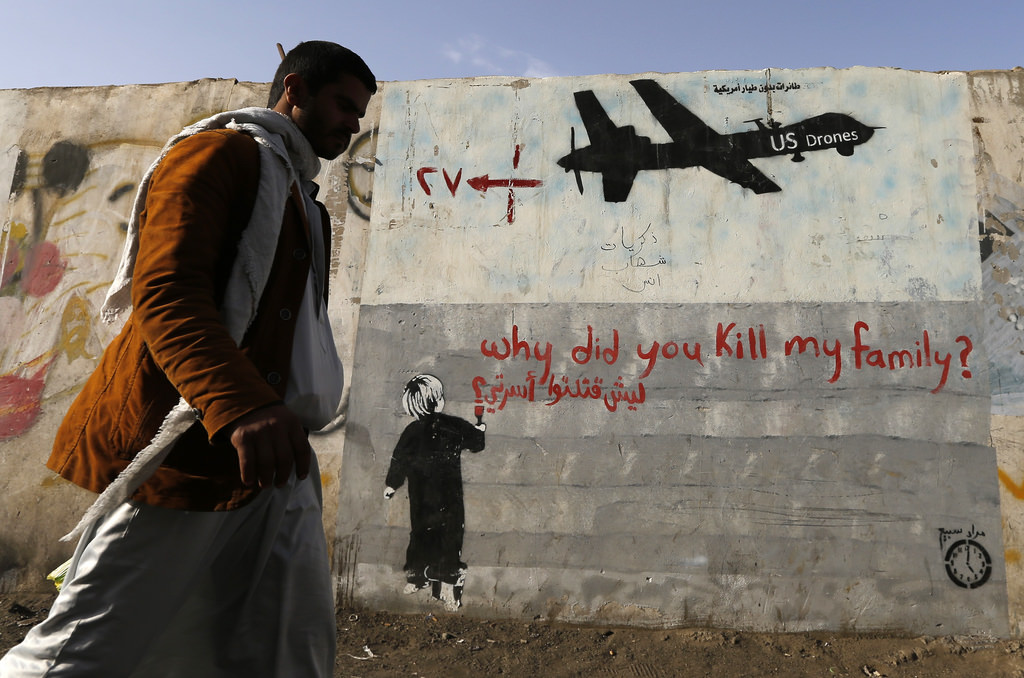This is the third of a three-part series of essays on Yemen highlighting the magnitude and impact of the civil war on Yemenis. Part 1, Part 2
“Everything has changed now: The shoulder is a shelf for coffins. The eye a well of tears. The lung a valley for death.”
– Sinan Antoon
Yemen is located on the southern edge of the Arabian peninsula, with the Red Sea and Egypt to its west, the Gulf of Aden and the Horn of Africa to its south, Oman on its northeastern border, and Saudi Arabia along its northern border. Once benign representations of Yemen’s geography and sovereignty, those borders now symbolize nothing but profound anguish. The edges outlining a nation whose people remain imprisoned while waiting for life-saving aid which may not come. What at one point was a country grappling with the contradictions of 21st century development and economic growth has been bombed so viciously and blockaded so resolutely that close to a million of its inhabitants may die from a disease easily cured by oral rehydration therapy – a medical expression for treatment by purified water and modest amounts of sugar, salt, and zinc supplements. Condiments and a few bottles from a local pharmacy in any European country, and water. That is all. And yet the international community continues to watch in horror, its reaction anemic, its response stunted.
It is of the utmost importance now, if only in spirit, to confront the individuals and institutions responsible for the pain felt by the millions who have done nothing wrong. The famously reluctant Marcus Aurelius wrote, “Death hangs over you. While you live, while it is in your power, be good.” It is necessary, again and again, to name names. To be good by never forgetting the horrific actions of those who would want the world to do nothing but forget their role in an historic cruelty.
The initial belligerents in the civil war were indigenous Yemenis: the Houthis, who are Zaidi Shiites. Sweeping through northern Yemen and then taking over the capital Sana’a in January 2015, the Houthis quickly destabilized the already-shaky regime of president Abdrabbuh Mansour Hadi. Some argued it was an Iranian or US backed conspiracy – others that it was simply Iranian and US backed. At the time it was not clear who, besides Iran, supported the Houthis and to what end their expansion was aimed. The Arab uprisings had by that point been roaring for three years, the Islamic State had reached its territorial zenith earlier, and Russia had just entered the Syrian civil war on the side of the regime. All that could be said was the Houthis instigated a conflict by attempting to overthrow a government.
But to lay the blame solely at the Houthis’ feet is at best disingenuous, and at worst a miscarriage of justice. After their initial expansion, current Saudi Crown Prince Muhammed bin Salman, who at the time was a newly-appointed Defense Minister, designated the Houthis an existential threat to his country. Bin Salman called on his allies, and his allies responded. Almost immediately bombs rained down on Yemen, and an inhumane blockade turned the country into a cage. Bin Salman insisted and continues to insist that the Houthis are an Iranian-backed Shiite insurgency piercing through the heartlands of Arabia, and that their goal is to ultimately conquer the Middle East. But what the prince seems to overlook is the sheer inhumanity of what he believes that justifies. In the two years since the beginning of the war, 113,000 children have died of preventable diseases. Not a new epidemic or a natural disaster or famine, though famine is also a consequence of the war. They died of diseases that could have been prevented by condiments and water. Condiments and water.
Backing bin Salman, and supporting him through nearly three years of senseless violence, was the United States government. Even before the 2016 election the US government sided univocally with the Saudi government during its intervention in Yemen. This should not be surprising – the US tradition of imperialism is well-documented, and even celebrated. What is disturbing, and what should be pointed out regularly and emphatically, is the profound hypocrisy of academics and liberals living in the United States who have overlooked the atrocities in Yemen for one indefensible reason or another. Whether it is The New York Times lionizing bin Salman for his supposed liberal reforms, or policy wonks standing by a treasured US ally, the callous indifference shown the Yemeni people is astounding. Yemen is either forgotten, ignored, or used, and its people, who are the most in need, are never the center of attention.
On December 4th Ali Abdullah Saleh, the man who preceded Hadi as Yemen’s authoritarian president, who once was the Houthi’s mortal enemy before allying with them to reclaim his throne, was killed. The future is bleak. And yet at no point should anyone forget those who are responsible for the civil war and their countless, faceless victims. Should the many conflicts in the Middle East ever end, and should peace ever return to the region for however short a period of time, it would be a final cruelty for the world to forget what happened in Yemen.
